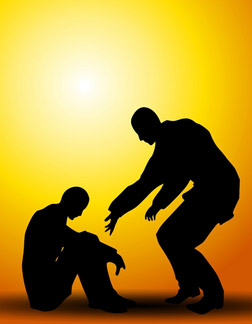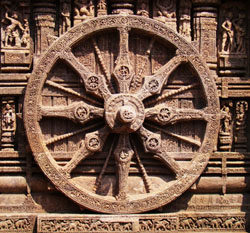 Anyone who spends time around Zen people will hear references to "practicing." Whenever we're asked to explain what it is we're practicing, we make either vague comments about Buddhic Nature or, as if we were mystical attorneys, we say simply that we're "practicing the Law of Dharma."
Anyone who spends time around Zen people will hear references to "practicing." Whenever we're asked to explain what it is we're practicing, we make either vague comments about Buddhic Nature or, as if we were mystical attorneys, we say simply that we're "practicing the Law of Dharma."
There is a difference between "Buddha Nature" and "Buddhic Nature." While Buddha Nature refers to the fact of an omnipresent, eternal True Self - the timeless holographic nature of the universe whereby the whole is contained in every part - Buddhic Nature, or Buddhi, refers to our innate ability to transcend the confines of the physical universe in order to realize this ultimate unity. But more than an ability, it is a force of love that inspires us to seek this unification. Shri Krishna describes it in the Bhagavad Gita as an "active process of consciousness." Psychologically speaking, it is the "stuff" that fills the gap between consciousness and mentation - the stuff koans are designed to illuminate. It is that ineffable quality of wisdom.
Right Action is the product of love - of the natural good in mankind exercised simply for the good of mankind. Our Buddhic Nature lives and breathes as though it has a life of its own, a life which can awaken within us at any time. When it does awaken, we discover with an astonishing clarity the essence of Right Action. The concept, when presented in obscure intellectual terms, is difficult to examine. We see it more clearly when we see it in action.
Recently, a member of our Sangha, who's a busy resident surgeon in an inner-city hospital, and his admittedly neglected wife took a vacation that they had looked forward to for over a year. They are amateur photographers; and they'd contracted to go on a tour of a remote Polynesian island. The highlight of the vacation was to be a boat trip upriver to a spectacular waterfall; but the trip did not go as expected. When he got back I asked him if he liked the falls; and he shook his head and said simply, "I never made it there." The remark had a troubling sound; but he didn't have time to explain and then, an hour later, when his wife called asking if I would be available for a private conversation, I put two and two together and got five. I knew that his wife resented his Zen practice. She understood and accepted the professional demands on his time, but at home she wasn't inclined to yield five minutes to him for meditation. For her, Zen served no purpose and made no difference.
When she arrived, the last thing I expected was that she would ask me to give her private instructions in Zen as preparation for receiving Buddhist Precepts. She had been given a glimpse of the Dharma in Action, she said, and she wanted to see more of it.
She told me that on the big day of the waterfall excursion, as they were eating breakfast just prior to boarding the river boat, one of the cooks came out of the kitchen and came to their table. It was apparent from his demeanor that he was deeply worried. "I have heard you are a doctor," he said to her husband. "My daughter is very sick. Can you help her? We live in a small village not more than 5 miles through the jungle on foot."
"I was speechless," she said. "I could see that my husband had tensed up and I expected him to say, 'Sorry' and gently tell the man that it would be impossible for him to go. But instead, he closed his eyes - just for a moment - and a look of peace came over his face. Then he said, 'Give me a moment to talk to my wife.'
"I couldn't believe that he would even consider going. As he saw it, I had three choices and he had one. I could go with the tour party to the waterfall, or stay at the little hotel, or accompany him to examine the sick child. But he could do only one thing... 'the Zen thing' as he put it. I was indignant. This was our vacation! I didn't say another word. I just left the restaurant and went to the dock and boarded the boat.
"Naturally, I had a wretched time. I didn't feel like talking to anyone. I damaged the camera trying to force film into it and didn't even get any pictures, but I didn't care. I remember saying something stupid like... 'If you've seen one waterfall, you've seen them all.' I was still miserable when we returned to the hotel and my husband wasn't back yet from the 'housecall'. There was a message for me, relayed by radio. There was a little clinic in the village... but no physician. He had taken the girl there and performed an emergency appendectomy on her. He'd be back the next day." I was so alone in my anger that I didn't realize that the hotel was buzzing about the incident. At lunch he returned and when he entered the dining room everyone stood up and applauded. He just waved and sat down with me. Never in my life was I so ashamed and so proud in the same moment. The kitchen staff brought us bowls of fruit and fish and garlands of flowers. One of the men who had gone to the falls - a photographer whose work we admired - brought him a roll of film saying that he had taken the shots for him. He hoped they were good. I sat there mutely... like a statue of an Indian goddess with all these hibiscus flowers around my neck and everybody bowing to me. I did not know what to say.
"So I went to see a waterfall, and were it not for the pictures someone else took, I couldn't describe it to a blind man. I saw nothing but my anger. But the beauty of the place was there... in everyone's eyes who looked at my husband with such admiration and appreciation. He saw beyond the waterfall. I was right about one thing: if you've seen one waterfall, you've seen them all. What I didn't realize was that while any fool can see a waterfall, only a rare individual can see beyond it, can see into all the other eyes that ever looked at it, can see that what they were admiring was the work of God, and that man is the greatest work of God. And all my husband would say was, 'I'm a Buddhist. To a Buddhist there is only Dharma.'"
She profoundly regretted that she hadn't gone with him to help the child; but I told her that the outcome couldn't have been better. If she had gone, she might not have begun 'to turn the wheel' and to gain this view of wisdom - Buddhi.
"In that brief moment that your husband closed his eyes and agreed to attend the child, he invoked Buddhi," I told her, "and it altered his perspective. He couldn't have known whether he'd be any use to the child... he was a surgeon and maybe she required an internist.. and he couldn't have known how you'd respond. But what he didn't know was unimportant. He had switched from relying on his rational intellect to deal with a situation to using his heart. How could he not have gone? So, you saw the power of the Dharma first-hand. It takes us and lifts us up - this is what all of us Zenners make such a big fuss about!" She wanted to know more... to feel for herself what she had only intuited. She wanted such extraordinary meaning and purpose to become ordinary experiences in her everyday life and that could mean only accessing the core of Buddhism: the Buddhic Nature of Buddha Nature. She wanted to practice Zen.
Many years ago I read a science fiction story by David Brin entitled The Practice Effect. The protagonist, Dennis Nuel, encounters a world where the second law of thermodynamics is reversed: instead of things "wearing out" from use, they "wear in" - they get better and stronger. So, objects of usefulness are created by "practicing" them. A wheel is created from a stone by simply turning it. At first the wheel may not be seen clearly through the stone which makes it difficult to practice, but eventually, practiced with diligence and perseverance, it rolls effortlessly wherever it's pushed.

Buddhi is Zen's wheel. At first we may not see it clearly and practicing it may seem an impossibility, but this is the Law of Dharma, not thermodynamics, and faith must be directed toward something unseen, unscientific and un-rational. This is a great leap of cognition -- it means acknowledging the possibility of something outside of rational perception - outside, even, of sensory perception. It means halting the thinking processes that blind us from realms of mystical experience. When the wheel comes into sight for the first time, we begin to experience the merging of Karma and Dharma, Action and the Law it obeys. When we can see ego as the illusion it is, actions dedicated to preserving or gratifying it seem ridiculous.
A process that begins with a slight act of will, if sustained, grows into Will that consumes us -- like David Brin's Practice Effect, we attain perfection of form and being through practice. When we're in touch with Buddhi, regardless of what we're doing, our actions will be well guided, whatever they may be. What joy to be an active participant in this life!
